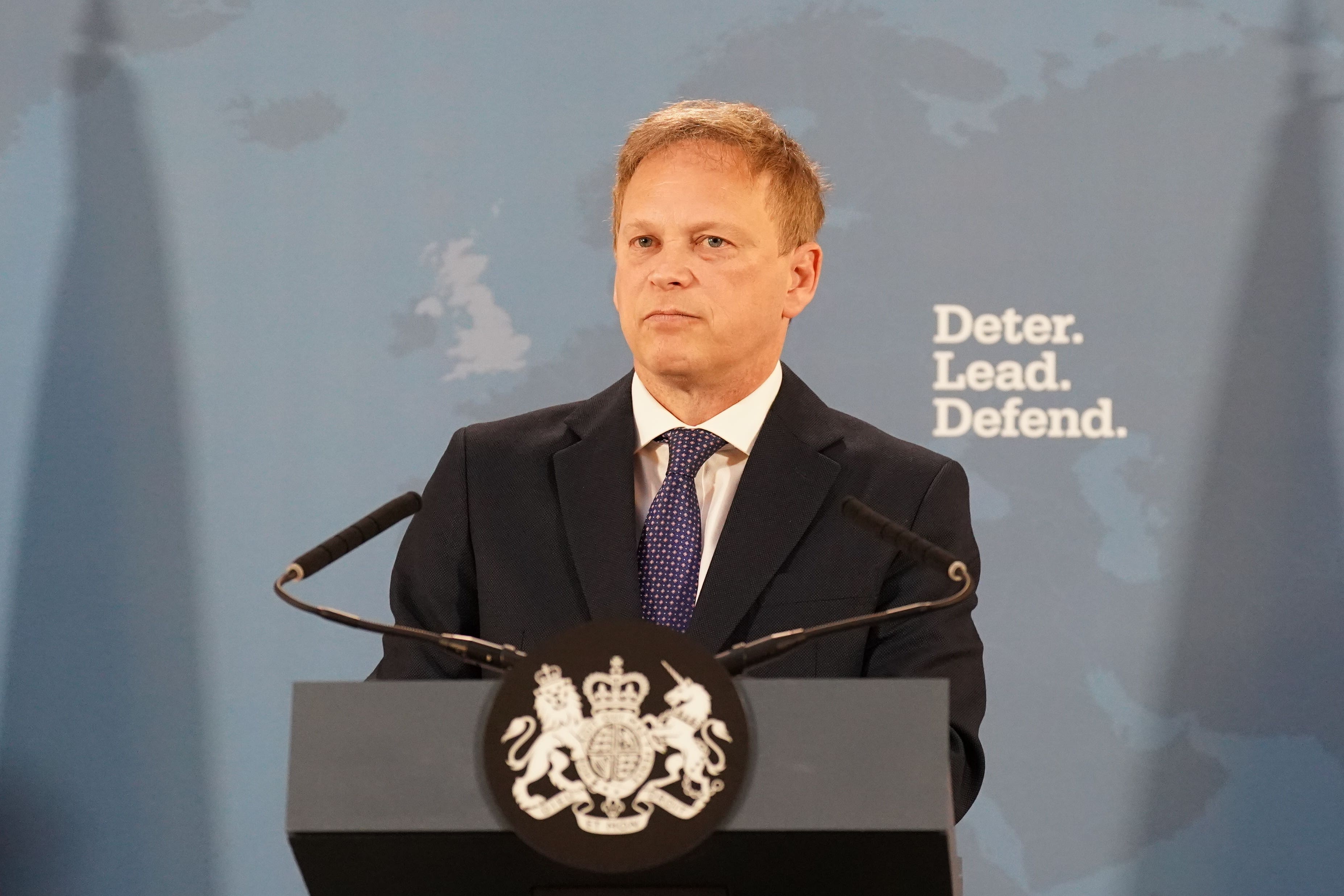Shapps makes case for increased western defence spending in ‘pre-war’ era
Defence Secretary Grant Shapps highlighted the risks posed by Russia, China, Iran and North Korea.

Your support helps us to tell the story
From reproductive rights to climate change to Big Tech, The Independent is on the ground when the story is developing. Whether it's investigating the financials of Elon Musk's pro-Trump PAC or producing our latest documentary, 'The A Word', which shines a light on the American women fighting for reproductive rights, we know how important it is to parse out the facts from the messaging.
At such a critical moment in US history, we need reporters on the ground. Your donation allows us to keep sending journalists to speak to both sides of the story.
The Independent is trusted by Americans across the entire political spectrum. And unlike many other quality news outlets, we choose not to lock Americans out of our reporting and analysis with paywalls. We believe quality journalism should be available to everyone, paid for by those who can afford it.
Your support makes all the difference.The UK is facing a “pre-war world” and the “peace dividend” that allowed successive governments to ease spending on defence is over, Grant Shapps has said.
Before taking the role, the Defence Secretary had backed a level of spending in excess of the Government’s goal and in a speech on Monday he set out the risks posed by countries including China, Russia, Iran and North Korea as well as terrorist groups in an increasingly dangerous world.
The UK has a goal of increasing defence spending to 2.5% of gross domestic product (GDP), a measure of the size of the economy, but Mr Shapps has previously argued that it should rise to 3%.
In a major speech at Lancaster House in London, Mr Shapps said:
– Failing to maintain support for Ukraine would be seen in Moscow and Beijing as a sign of weakness;
– North Korea is promising to expand its nuclear arsenal, and Iran’s uranium enrichment programme is at a level for which “there is no civilian application”;
– China and Russia are to blame for a “significant number” of the cyber attacks targeting the UK.
Mr Shapps said the UK has increased its funding, with a record £50 billion a year being spent on defence.
But his speech to an audience including military top brass and diplomats will be viewed as a push for extra funding – both at home and by Nato allies, many of whom are not meeting the alliance’s 2% of GDP spending target.
“We made the critical decision to set out our aspiration to reach 2.5% of GDP on defence, and as we stabilise and grow this economy we’ll continue to strive to reach that as soon as possible,” he said.
“But now is the time for all allied and democratic nations across the world to do the same thing and ensure their defence spending is growing too.
“Because the era of the peace dividend is over. In five years’ time we could be looking at multiple theatres including Russia, China, Iran and North Korea.
An age of idealism has been replaced by a period of hard-headed realism. Today our adversaries are busy rebuilding their barriers, old enemies are reanimated, new foes are taking shape, battle lines are being redrawn
“Ask yourself, looking at today’s conflicts across the world, is it more likely that that number grows or reduces? I suspect we all know the answer. It’s likely to grow.”
Mr Shapps said the Government has already announced “the largest sustained increase in defence spending since the Cold War”.
“We find ourselves at the dawn of this new era – the Berlin Wall a distant memory – and we’ve come full circle, moving from a post-war to pre-war world.
“An age of idealism has been replaced by a period of hard-headed realism. Today our adversaries are busy rebuilding their barriers, old enemies are reanimated, new foes are taking shape, battle lines are being redrawn.
“The tanks are literally on Europe’s Ukrainian lawn and the foundations of the world order being shaken to their core.”
Mr Shapps used his speech to commit 20,000 service personnel to one of Nato’s largest military exercises since the Cold War, as the alliance steps up its preparations to resist Vladimir Putin’s Russia.
The war games come after ministers announced a further £2.5 billion support package to Ukraine and the RAF carried out air strikes, with the US, on the Houthis in Yemen.
Mr Shapps said the UK has now trained more than 60,000 Ukrainian troops.
Speaking in the Commons, Prime Minister Rishi Sunak told MPs: “Ukraine’s rightful place is in Nato and Nato will be stronger with Ukraine in it, but these commitments will help bridge the gap until that day comes.”
Labour leader Sir Keir Starmer backed the package of support, saying: “To those listening in Kyiv, Moscow or elsewhere in the world let me be clear: whoever is in Government in Britain, the UK will stand with Ukraine for as long as it takes.”
During a Commons statement on defending the UK and allies, Mr Sunak said: “Russia must pay for the long-term reconstruction of Ukraine and I have been clear about that.
“And actually, on the G7 leaders’ call at the end of last year, I was the one who raised this issue, and as a result we have collectively in the G7 tasked finance ministers to explore all lawful routes to ensure that Russian assets are made available for that purpose.”